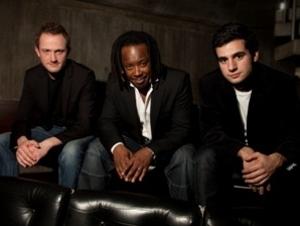Search
Rychard Carrington reports on Dennis Rollins' Velocity Trio - Cambridge Modern Jazz Club, 3 February 2011

Whoah! Returning straight from The Junction 2 to write this at home, my spirit is still pulsing with the excitement of live jazz played with masterful invention, controlled energy and cool passion. This is what live music is all about, or should be: the sheer immediacy is integral; a recording cannot be the same. And though I like many musical genres I don't there's anything quite like modern jazz for producing such sheerly musical richness in such a relaxed yet vibrant way.
Tonight was a great example of jazz at its very best. Dennis Rollins' Velocity Trio features a unique combination: trombone, drums and Hammond organ. Are there any players of their respective instruments better than Dennis Rollins, Pedro Segundo and Ross Stanley? Obviously the claim is most audacious for Segundo, drummers being by far more common than trombonists or Hammond organists, yet I don't recall ever having enjoyed drumming more than at this performance. In fact I often find drumming the one element in the mix I would like banished, but cetainly not tonight. The drums were giving more prominance than is usual, and Segundo - busy, creative, full of youthful energy - peformed his leading role superbly. The Hammond can have a slightly cheesy sound, creating a Sixties nightclub ambience and little more, but Stanley is a true keyboard wizard, weaving mellifluous intricacies that were a stimulating joy in themselves.
The forty-six-year old Dennis Rollins, with much high-level jazz experience behind him, is clearly excited to be playing with such brilliant young musicians (the trio are due to start recording their first album this month). He allows them much of the attention, with numerous solos apiece and even a duo version of Larry Goldings' Moonbird. But of course it is Rollins who directs the sound, leading with powerful, instinctive, soulful trombone - sometimes funky, sometimes swinging, often sensitively understated. The overall sound is so well integrated, so winning, that one forgets what an unlikely combination of instruments this is.
Most of the tunes were self-penned, although influences such as Eddie Harris and Larry Young were generously acknowledged. The number with the potential to reach a large audience was a superb recreation of Pink Floyd's Money.
Cambridge Modern Jazz Club has been putting on gigs of the very highest standard. Modern jazz really shouldn't be such a minority interest. Its appeal rests in a sophisticated realisation of the essence of musical pleasure, so do give it a chance and you might acquire a taste that delivers deep and subtle satisfactions. And it definitely should be heard live.
Writer: Rychard Carrington